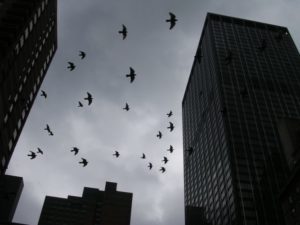A Sinister flight! Poem by Aneeta Chitale

I was a happy bird….with great
Wings to fly …thousands of miles
In open skies…..in cloudy pallets
I flew in seamless oceans
Across the seven seas and
Five continents….in peace!
I knew I was the best chosen
By The Creator….God! Almighty!
I flew in all directions….untill
One day, me and my friends
flew to Wuhun…..China.
The land of plenty
The stuff the make..’.made in China!’
I flew no more…..as
I could feel and see sinister things one day….17 feb 2020
I saw people in bio…suits wearing masks….
These were the human beings
Plundering in n out
With Masks tied on their faces
They rattled here and there….
Untill …we saw many humans succumb to deaths ….in thousands!
No birds flew, no birds chirped, no peacocks danced, and no humans were seen ….
In broad day light, as if the sun had not rose …..on those days…
The deaths tolled but no one cried
Of pathos and woes!
Their were silent fickle cries
….no moaning of deaths…no sermons read…
when your
Beloved parts…..suffocated breaths!
The hues…very stoic n still
Roads that roared of thousands of cars n speeding vehicles
Were barren ….all deserted roads
The people were sick….were quarantined by state n folks!
No birds chirped, peacocks danced, no church bells rang
No tombs clad with wreath!
No obescience no moaning pictures
Captured….
No ships sailed! No Airplanes flew
No tubes shuttled
All that rattled were people
On masks n deathbeds!
No Monk came to bless the departed!
No President read grieving speeches!
No Countries were told of
This pandemic and deaths charts read
They hushed up WHO !
Such is the gloom and cunning guise
All under the subterfuge , of a Corona Virus- Mask!
No people spoke in Chinese Lands!
Their markets closed in Wuhun!
Then….we all paled in the face of death….my friends went to far of lands ….
Thinking it were safe n happy,
But my friends the Corona Virus had plagued…..more deaths in this pandemic….
Millions lay sick and fighting for life!
The Leaders of Countries World Over, were shattered
But uttered words of promise n hope for mankind!
Cities are locked down, no ships catered on ocean routes
No planes flew in blue skies
No peacocks danced this Spring Season
No Spring Equinox celebrated!
No birds flew in seamless skies…
But birds and animals gathered in hooks and
Prayed for all beings well being!
The shepherd’s took a different route !
Something is sinister down China road!
The old traders, turned their routes off- China routes!
The Black Blanket Covered it all!
I flew away, away thousands of miles
With my friends …!
I knew this…..when I saw my reflection in crystal clear waters!
